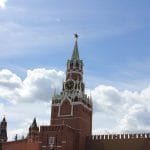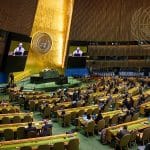Within 24 hours of the end of bilateral discussions on the sidelines of the EU-Western Balkans Summit in Sofia late last week, a new potential name — the Republic of Ilinden Macedonia — proposed by Macedonia/FYROM Prime Minister Zoran Zaev in his close private sessions with Greek Prime Minister Alexis Tsipras, leaked out of Skopje.
By the weekend, the main opposition parties in both countries quickly rejected this new proposal as irredentist or otherwise unacceptable, but it is not yet off the table. Foreign pressure for an agreement before the summer EU and NATO summits appears to be increasing steadily as the action now shifts to the US where a new round of discussions between both countries’ foreign ministers is being called by UN Mediator Matthew Nimetz for May 24-25.
It is unclear what role the United Nations played in formulating this new proposal or if it was simply a fresh Zaev government idea. What is clear is that Zaev received a warm enough reception from Tsipras when he proposed it May 16 or 17 that he made extremely positive statements to his country’s media even before the Greek government could examine the proposal in detail. Almost as soon as the Republic of Ilinden Macedonia proposal — a reference, which before that day meant absolutely nothing to over 90% of the Greek population — was leaked via the press in Macedonia/FYROM, a statement of strong opposition was issued by Greece’s New Democracy party, who are substantially favoured to win the next election, and therefore a key factor.
New Democracy issued a strongly worded statement regarding the Ilinden proposal, saying, “This name is linked historically and directly with an intent to create a “Macedonian” nation and state, one that includes Thessaloniki and extends to the Aegean Sea. Whatever reference to Ilinden in the name of the neighbouring country, not only fails to end irredentism in Skopje but to the contrary, confirms and strengthens it… this is unacceptable, even for discussion.”
Within Macedonia/FYROM, things also seemed to careen off course. After meeting with Zaev on May 20, the leader of the nationalist VMRO-DPNE party, Hristijan Mickoski, announced that the “VMRO-DPNE, will not support a change to the constitution with the goal to change the constitutional name.” The VMRO-DPMNE is the main opposition party, and Zaev has no hope of passing key constitutional revisions in the 120-seat Parliament without the party’s support.
A silver lining?
Despite the noise, there is room for some optimism in that key players in Zaev’s government have apparently accepted the Greek argument that one name must be used for all domestic and international purposes, which the Greeks call the “erga omnes” application. In making this Ilinden proposal, Zaev believed at the time that his country could accept the erga omnes concept and with the appropriate agreed name it would proceed to revise the constitution based on the support of most of the opposition. Whether Ilinden passes the test or not, movement on this core issue still constitutes substantial progress; Skopje now clearly recognizes what it will have to accept to close any deal and this is not something foreign pressure on Greece will change.
What is the Trump Administration up to?
At least this week, Washington’s interest in an early Name Dispute settlement is no longer shrouded in generic statements of support for the Nimetz-UN effort. US Vice President Michael Pence initiated a phone call on May 19 to PM Tsipras in Athens.
Spoke to Greek PM @tsipras_eu today. Thanked him for his leadership, along w/ Macedonian PM Zaev, on efforts towards resolving longstanding name dispute. Historic opportunity. Hope both parties can reach mutually acceptable agreement & promote peace & stability in region.
— Vice President Mike Pence (@VP) May 19, 2018
We can discern Pence’s staff was probably aware of New Democracy’s opposition to the Ilinden name but still unaware of VMRO-DPNE’s resistance at the time the “historic opportunity” call was made. Considering the embarrassment this over-reaction must be causing, one must wonder why the urgent burst of activity happened over the weekend and precisely where the recommendation to Pence to engage Tsipras came from.
The Pence call was just a warm-up it seems, as Greek Foreign Minister Nikos Kotzias is swinging though Washington May 21-22 en route to his May 24-25 meeting in New York with Nimetz and Macedonia/FYROM Foreign Minister Nikola Dimitrov. Kotzias will meet with Secretary of State Mike Pompeo, a meeting that was actually set up long before the Ilinden proposal emerged, as well as National Security Adviser (NSA) John Bolton, and of course the Greeks will fill Kotzias’ time in Washington with the normal media encounters, Congressional meetings, as well as contact with Greek-American groups.
It should be noted that NSA Bolton became quite an expert on the Name Dispute while serving as US Permanent Representative to the UN under George W Bush. While Kotzias is not going to Washington simply to work on the Name Dispute, considering the large number of regional challenges Greece faces, by the end of the week we shall be in a position to understand if the Trump Administration is truly interested at senior levels or if the pressure to take action before the summer EU and NATO summits is merely the product of career officials hoping to make some progress on the issue and ride the “peace train” forward, now that it is actually inching ahead.







